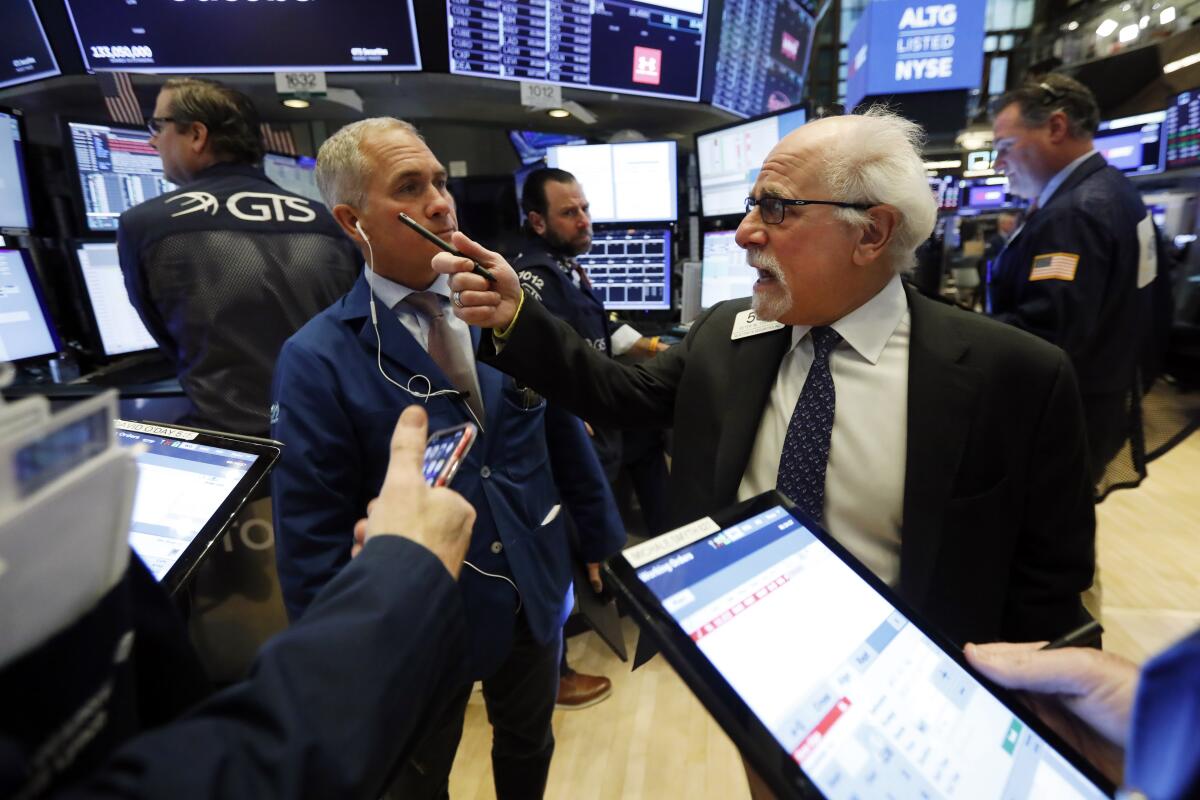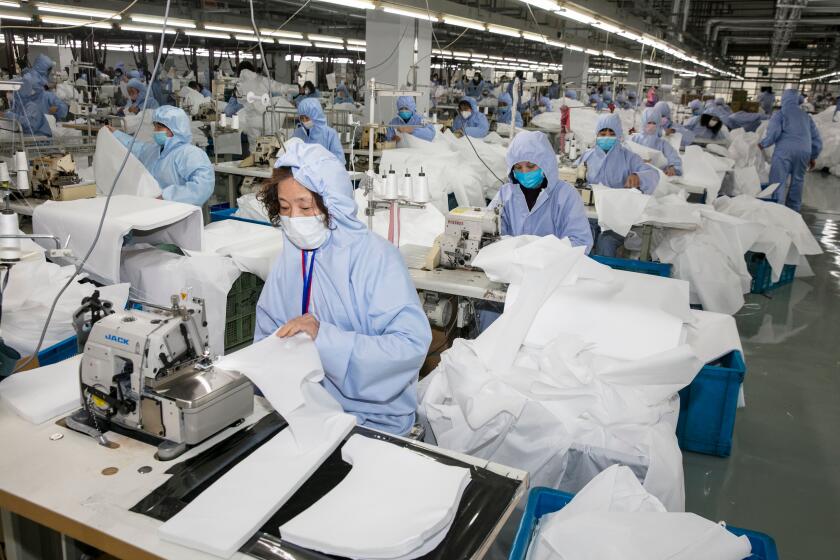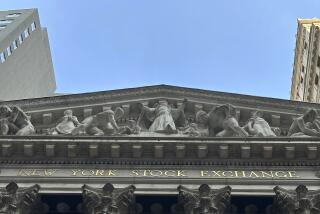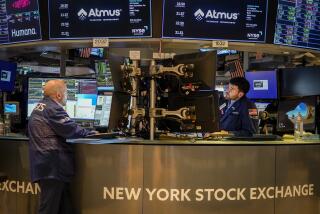Stocks fall after Apple warns coronavirus will hurt its revenue

- Share via
The Standard & Poor’s 500 index and Dow Jones industrial average fell modestly Tuesday as U.S. stocks gave up some of their solid gains from the last two weeks.
Banks and technology stocks accounted for most of the decline. The Nasdaq composite eked out a tiny gain, notching another record high.
The selling came as investors weighed the effect of the coronavirus outbreak on Apple and other major companies.
The tech giant said revenue for its current quarter will fall short of previous forecasts because production has been curtailed and consumer demand for iPhones has slowed in China. Apple’s stores there are either closed or operating on reduced hours.
The deadly coronavirus outbreak is hurting scores of companies in California and nationwide that depend on Chinese production and consumer spending.
The iPhone maker is among the most notable companies to warn investors that the virus will hurt its financial performance. Medical device maker Medtronic also warned Tuesday that the outbreak will affect its quarterly results.
“The longer this goes on, the greater the focus is going to be on how much is this going to impact companies like Apple, which is considered not only a bellwether in tech but a bellwether for the market overall,” said Randy Frederick, vice president of trading and derivatives at Charles Schwab.
The S&P 500 index fell 9.87 points, or 0.3%, to 3,370.29. That’s just below the all-time high it set Friday.
The Dow slid 165.89 points, or 0.6%, to 29,232.19. The Nasdaq recovered from an early slide and finished with a gain of 1.56 points, or less than 0.1%, at 9,732.74.
The Russell 2000 index of smaller-company stocks fell 4.06 points, or 0.2%, to 1,683.52.
Bond prices rose. The yield on the 10-year Treasury fell to 1.56% from 1.58% on Friday.
Stocks began lower Tuesday as U.S. markets reopened after the Presidents Day holiday.
As in recent weeks, traders reacted to the latest developments in the coronavirus outbreak that began in China and has since infected more than 75,000 people. Most of the cases and 2,000-plus deaths remain centered in China.
Businesses worldwide are increasingly caught in the economic fallout from the outbreak. The Beijing auto show in April, the industry’s biggest global event of the year, is being postponed indefinitely.
Technology and healthcare companies have been the most vocal about mentioning the new coronavirus in their earnings conference calls, according to FactSet.
Although Apple’s projected revenue miss took Wall Street by surprise, some analysts played down the iPhone production delay’s long-term effect on the company. In a research note Tuesday, Canaccord Genuity analyst Michael Walkley said Apple continues to perform strongly across all business lines, including iPhone 11 demand outside China.
Apple shares fell 1.8%. Medtronic slid 4%.
Despite the uncertainty over the viral outbreak, investors have been willing to buy back into the market after a dip. The S&P 500 has ended higher the last two weeks and is holding on to a 4.5% gain this month.
For the most part, investors are betting that the economic fallout from the outbreak will be limited to the first three months of this year, Frederick said. But if companies signal that they expect lingering effects on their business into the second quarter, investors could become less eager to jump back into the market.
“There are just so many people out there that think every dip is a buying opportunity, and so far, they’ve been rewarded,” Frederick said. “We’re going to see that for a while, until we have a really big downturn and people really get hurt by it. We just haven’t had that in a long time.”
Technology stocks accounted for a big slice of the selling Tuesday. Declines hit several chipmakers, which rely heavily on China for sales and supplies. Intel fell 1.7%. Broadcom slid 2.2%.
Bank shares lost ground. HSBC said it will cut 35,000 jobs and shed $100 billion in assets. Its shares dropped 5.6%. Wells Fargo slid 2.5%.
Energy stocks also fell. Schlumberger declined 2.2%.
Communication services stocks and utilities held up better than most of the market. T-Mobile US rose 3.5%, and Xcel Energy rose 1.3%.
Traders continued to assess company earnings reports. Advance Auto Parts climbed 6.2% after the auto parts supplier posted results that beat Wall Street forecasts. Conagra Brands dropped 6.1% after the food producer cut its fiscal 2020 profit and revenue forecasts, citing surprisingly weak consumption.
Among S&P 500 companies still to release their earnings, Progressive will report Wednesday and ViacomCBS will report Thursday.
Financial services company Franklin Resources jumped 6.9% after saying it is buying competitor Legg Mason for $4.5 billion. The deal will create a financial company with a combined $1.5 trillion in assets under management. Legg Mason shares leaped 24.4%.
Benchmark crude oil was unchanged at $52.02 a barrel. Brent crude oil, the international standard, rose 8 cents to $57.75 a barrel. Wholesale gasoline rose 3 cents to $1.61 a gallon. Heating oil fell 3 cents to $1.67 a gallon. Natural gas rose 14 cents to $1.98 per 1,000 cubic feet.
Gold rose $17.30 to $1,600 an ounce. Silver rose 41 cents to $18.13 an ounce. Copper was unchanged at $2.61 a pound.
More to Read
Sign up for Essential California
The most important California stories and recommendations in your inbox every morning.
You may occasionally receive promotional content from the Los Angeles Times.













